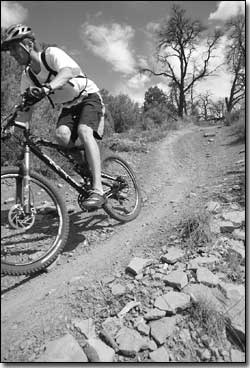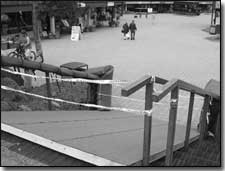|
 |
A mountain biker uses his lunch break to
log a few miles in Horse Gulch on
Tuesday. After several years in the doldrums, Durango has returned
to the fore
of the national mountain biking scene, thanks largely to local
efforts like the
Durango Wheel Club and community involvement in events like
the Iron Horse
and NORBA Finals./Photo by Todd Newcomer. |
A casual look reveals that cycling is currently booming in Durango.
The town boasts an impeccable trail system, a flourishing series of
weekly club rides and hosts numerous, nationally renowned events. This
weekend that boom will be especially apparent as the National Off-Road
Bicycle Association brings its national finals and nearly 2,000 riders
to Durango for the third year in a row.
However, recent history also tells a different story. A serious case
of the doldrums afflicted the local cycling scene only a few years ago.
But a combined community effort and several external factors have worked
to bring back the bicycling heyday of the late '80s and early '90s.
And the local cycling community is working toward a future in which
Durango becomes a major piece of the cycling universe.
NORBA first brought its National Mountain Bike Championships to Durango
in 1986. At that time, mountain biking was a relatively new creation,
and the podium was dominated by now legendary names like Tomac, Murray
and Overend. In coming years, Durango would go on to host four additional
NORBA races and six Colorado State Off Road Championships. And in 1990,
local mountain biking was at a high point, when the Iron Horse Bicycle
Classic presented seven different events to 1,500 cyclists over Memorial
Day Weekend. These numbers made the event one of the largest of its
kind in the nation that year. Later that summer, Durango hosted the
first-ever internationally sanctioned World Mountain Bike Championships.
A fractured community
However, a shift in energy and interest hit not long after that watershed
year. NORBA paid its last visit for what was to be many years in 1992,
and the state championships went away after 1993. Kendra Holmes, event
director for both the Iron Horse and NORBA races, commented, "In the
mid-1990s cycling totally took a dive in Durango. Things kind of got
started here, but then started moving away to other areas."
Ed Zink, owner of Mountain Bike Specialists, chairman of the Iron Horse
Bicycle Classic Committee since 1971 and a Mountain Bike Hall of Fame
inductee, agreed. Zink said that the slump was partly the result of
a natural cycle, but that local politics were mostly responsible. "There
got to be a bit of a turf war in Durango between the Yeti group and
the Barracuda group, and the local cycling community got fractured," he
said. "To put on these kinds of events takes an entire community working
together."
Local interest and passion for two-wheeled recreation and racing also
appeared to be on the wane during the period that lasted through 2001.
Ivan Unkovsky, a local racer and one of the forces behind the 2002 resurgence
of the Durango Wheel Club, said, "After it was in its first Olympics,
mountain biking was supposed to explode, and instead it just fizzled."
The Tuesday night group road rides provided a good barometer of the
local scene, and in the mid-1990s, they were in danger of fading away,
according to Unkovsky.
"I remember the days when I'd show up to a Tuesday night ride, and
there'd be two other people there," he said.
The revival of the wheel
With the help of the reborn Durango Wheel Club, there are now four
separate Tuesday night rides catering to various skill levels along
with a Wednesday night development ride. According to Michael Carroll,
Wheel Club president, these rides put more than 250 people on road bikes
and local roads every week.
"For a number of years in Durango, there was no organizing body for
the cycling community," Carroll said. "A few of us got together and
decided we needed to get the club back together."
The resurgence of the club, the birth of the cycling team at Fort Lewis
College, leaps in mountain and road bike technology, and a guy from
Texas named Lance Armstrong all deserve credit for the current local
boom. However, local involvement and interest are the biggest factors,
according to all sources.
"We're at an all-time high now with the Durango Wheel Club," said Unkovsky. "The
college team is also at a high and wasn't even in existence seven years
ago. Cycling in Durango seems to just get bigger and better."
Holmes agreed that Durango has made a commitment to making cycling
a positive and growing feature of the local community. This makes Durango
appealing not simply to cyclists but also to organizations like NORBA.
"People are interested in seeing a race here because we are interested
in keeping mountain biking not only alive but helping
it grow," Holmes
said. "What we're trying to do between the Durango Wheel Club, the college
cycling club and the events we put on is keep Durango a sustainable
cycling area. We really have set precedence around the state and country
in terms of relationships. We want to maintain those relationships and
keep cycling a viable local institution. "
Heart and soul
Zink concurred that this community passion is really what sets Durango
apart from other cycling destinations. "The events are done by the community
in Durango, and they're done by the corporation in all the other places," he
said. "There's personality and there's feeling in Durango, and that's
what makes it."
 |
A short-track ramp marked off
by Shimano warning tape sits ready for action
over the steps in the plaza at Durango Mountain
Resort. NORBA is holding its
National Finals at the resort this weekend and
has signed a three-year contract
with DMR./Photo by Todd Newcomer |
Jeff Frost, one of NORBA's managing partners, noted that the National
Championships Series makes 10 stops this year, and the Durango one is
definitely unique. He noted that not only does Durango have a rich bicycling
heritage, but that the present passion for cycling is virtually unparalleled
in the country.
"It's really the heart and soul of mountain biking," Frost said. "Durango
was really the first stamp on mountain biking"
Interestingly, NORBA is currently focusing more on community energy
than on specifics of the venue, and Durango is one of a few perfect
fits. "Durango, Mt. Snow and Big Bear are the three leaders on the series
in terms of attendance and feel," Frost said. "The history of those
three venues provides for an incomparable experience."
With this in mind, Frost concluded that Durangoans can expect to see
NORBA for many years to come. "This is year one of a three-year contract," he
said. "We don't see any reason why it won't continue beyond that point."
The cycling capital of America
Many local cycling advocates are thinking well beyond the next three
years. Unkovsky noted that the local pool of talent is exceptional and
growing. Naming Fort Lewis College racers like Dan Bowman, Mitch Mormon,
Cody Peterson and Matt Shriver, he said, "Sure we've lost Tom Danielson
to a European team, but there's a whole new crop of guys coming through.
The pool of local talent is just incredible."
Carroll added that the Durango Wheel Club wants to encourage all of
Durango's cyclists and that the club has high expectations for the future. "We
want to be a resource for cyclists of all levels," he said. "There are
a number of things we can do to make Durango the cycling capital of
America."
Carroll said that the club is beginning to partner with La Plata County,
the City of Durango and the Colorado Department of Transportation to
make area roads safer for cyclists and automobiles. The first success
of those efforts will be realized before the end of the year with the
addition of "Share the Road" signs along the valley loop.
A second push will entail encouraging existing programs like Durango
BMX and the Fort Lewis College Cycling Team, according to Carroll. "The
college cycling team is already seen as the force in the country, and
we want to help grow that and make it sustainable and not just part
of the college but part of the community," he said.
Helping with this growth will entail the addition of coaching infrastructure
and a development team that will enable riders to jump into professional
cycling. In addition, the Wheel Club will generally work to promote
cycling inside and outside Durango. And like Zink, Holmes and Unkovsky,
Carroll looks not just to the Wheel Club but to the greater community
to carry cycling into the next decade.
"The great thing about cycling in this town is that the Durango community
is so supportive of it," Carroll concluded. "Even if people are not
cyclists they are still supportive of it. I hope we can see that continue
and make sure it continues."
.
|